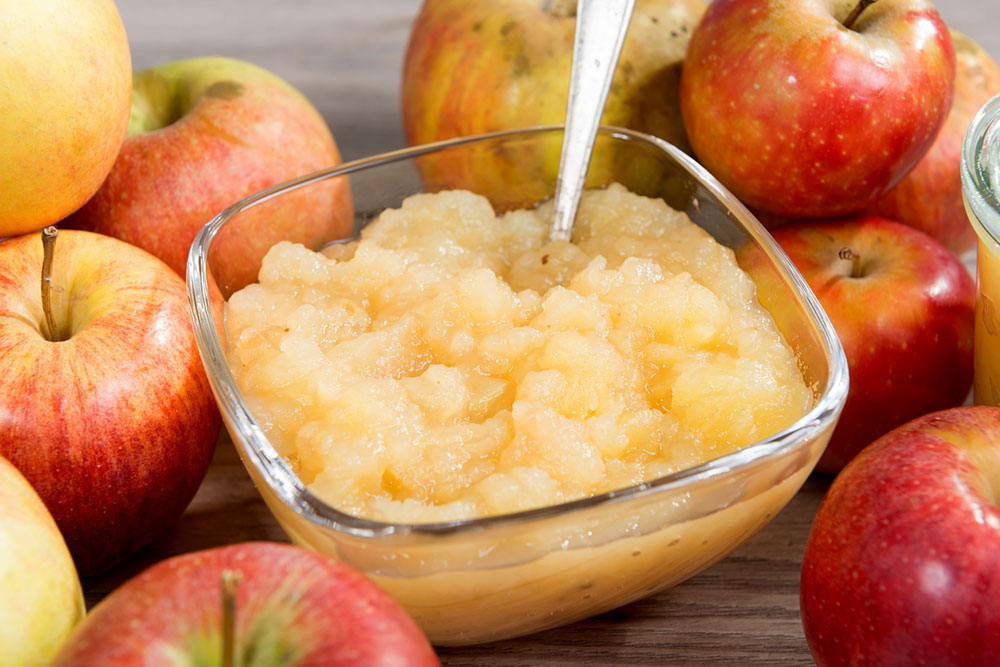
Foods to eat and avoid for managing ulcerative colitis
Ulcerative colitis is a chronic inflammatory bowel disease resulting in ulcers and inflammation in the colon. The exact cause of the disease remains unknown, but it is predominantly associated with genetics, individual lifestyles and eating habits, and several environmental factors. But when dealing with UC, one must be cautious of what to eat and avoid. This article will guide you through certain foods to eat and avoid to help manage ulcerative colitis better.
Foods to eat
Here is a list of foods to eat in your ulcerative colitis meal plans:
Applesauce
During a flare, your gastrointestinal system can become irritated, so it’s best to stick to soft and easily digestible foods such as applesauce. Avoid sweetened varieties as they can cause more inflammation. To prepare sugar-free applesauce, cook peeled and sliced apples in water, then blend the mixture until smooth.
Ripe bananas and canned fruits
Your dietician may advise against consuming raw fruits during a flare-up, but soft, ripe bananas are usually well tolerated. Bananas are a good source of carbohydrates that provide energy and are a good source of fats and protein. Further, soft fruits like canned peaches or pears are not irritating.
Cooked vegetables
Cooked and soft vegetables like spinach and carrots can offer crucial nutrients like vitamins A and K. However, before consuming, confirm the veggies are well-cooked enough to be mashed by a fork to ensure any potentially irritating fiber is broken down.
Probiotics
Those who are not lactose intolerant can consider adding yogurt to their meal plans. It will offer probiotics and protein. Probiotics are live bacteria that help the digestive system. However, read the label carefully during your pantry shopping and pick yogurt that says active and live culture on the label. Do not pick yogurt with large fruit chunks, as it can be complex to digest. Lactose-intolerant individuals can opt for probiotic supplements.
Nut butters
Almonds, peanuts, cashews, and other nut butter are excellent healthy fats and protein sources. So, opt for creamy peanut butter to avoid those difficult-to-digest nut pieces that can trigger irritation during a flare. You can enjoy nut butter with bread or wrap them in a tortilla.
White rice with turmeric
Some people with severe UC cannot tolerate most foods during the flare. So, they can consider bland choices like cooked white rice. Sprinkle some turmeric to add flavor. This yellow spice is anti-inflammatory and has curcumin that helps with ulcerative colitis.
Beverages like fruit juice, sports drinks, and water
People with UC might often suffer from diarrhea. It might make you lose a lot of water, and replenishing it is imperative because every symptom amplifies when you have diarrhea. No-pulp fruit, water, or sports drinks mixed with water in a 1:1 ratio can be beneficial. These can help rehydrate and manage symptoms better.
Refined grains
These include white rice, oatmeal, gluten-free bread, white pasta, and potatoes. They are easier to digest than whole grains.
Foods to avoid
Here is a list of foods to avoid when you have ulcerative colitis:
Beans
Beans and legumes have a high fiber content. They may trigger gas and are unsuitable for those with UC.
Tea and coffee
Coffee is a diuretic and can fuel bathroom breaks, even in people sans IBD. Hence, it will make the situation more challenging for those with UC. The same applies to other caffeinated beverages, including tea and products with guarana, a common stimulant in energy drinks.
Dairy
People with lactose intolerance must avoid dairy. Dairy may trigger IBD-like symptoms. However, that does not mean everyone with UC should avoid milk. You can try including milk in your meals. If it does not cause any symptoms, there is no harm in continuing with it.
Broccoli
Fiber-rich veggies like Brussels sprouts, celery, cabbage, and broccoli do not digest easily. They can trigger bloating, cramping, and gas in people with UC. However, you can tolerate these foods provided they are chopped into smaller pieces and cooked well, but if not, look for alternatives to make up for these nutrition-dense veggies.
Seeds
Do not eat whole seeds if you have UC flare-ups. However, finely ground seeds should not be a problem.
Corn and mushrooms
These are hard to digest and can cause diarrhea and GI irritation in people with UC. Hence, avoid them during a flare-up.
Other tips
Beyond devising the correct meal plan, here are some additional tips to help with UC management.
- Consume four to six smaller meals daily instead of two to three big meals.
- Do not drink through straw, as it makes you swallow air, resulting in gas and bloating.
- Stay hydrated when you experience diarrhea.
- Instead of frying, adopt cooking techniques like poaching, steaming, and broiling.
- Maintain a food journal to keep track of what you eat around the day
- Do not gulp and chew your food until it is pulverized




